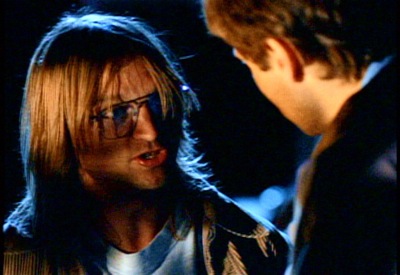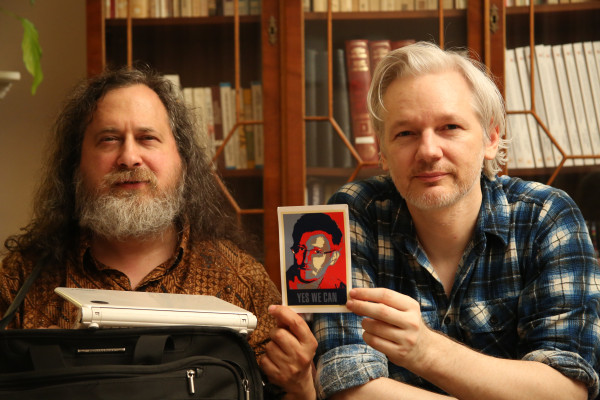Chris Carter is coming out of “post-XF retirement” — which I’m sure was very enriching for him personally! — not with just one but two projects for television: The After and a second, yet untitled, show. See here for The After.
The existence of a second show separate from The After was revealed on August 23 2013 in an interview by Vulture (full interview posted on August 27):
Does that affect what projects you want to work on in the future?
Yeah, I’m involved right now with AMC and I’m also involved with Amazon [Studios], and these are, for me, new platforms and new approaches and they have different expectations. With Amazon, it’s completely uncharted territory, which is really exciting.You always like to do more than one series at a time. What’s going on with AMC?
They approached me with an idea that I really, really liked. It was actually a book. They wanted to know my take on it. At first, I turned them down; I said I didn’t have a take. Then they came back to me again with the book and asked if I would read it again. So I read it again and I did have a take on it. It also owes to The X-Files, and I’ve written a draft and I’m writing a second draft.
And is it a book that people might recognize?
[Long pause.] I’m not going to spoil it.What current events would you mine to turn into an X-file?
Actually, with the AMC project, I think that I am treading on some of this interesting ground that Bradley Manning, Edward Snowden, and Julian Assange have uncovered for us.You said once that you created the show to tap into people’s vulnerabilities and what keeps them up at night. Twenty years later, is anything keeping you up at night?
Um … yeah. [Laughs.] I have to say, I’ve become very interested in the spectrum of political discourse as seen on the cable news channels that are conveniently right in a row on my cable provider’s dial. I can flip from Fox to CNN to HLN to MSNBC, and I find myself at night flipping it back and forth through them and it’s something of an addiction. Not necessarily for the content, but for the context. [Pause.] And I’m writing about it.And so your AMC show might touch on that as well, à la Newsroom?
There will be some of that.
You said you’re rewriting a draft now. Is this something that might be happening in the next year, two years, season?
I don’t know. It’s up to the Fates. I will be done with a draft shortly, so I will know more shortly.
…and that’s essentially all the information there is!
This is still a project very much in its initial brainstorming phases, much less mature than The After, which is developed enough to go on production. This show first has to go through many draft phases and discussions between AMC and Carter before AMC decides to go through with it (or not) and order a pilot to be shot — and then it might not necessarily go through all the way to series. So this is potentially something that might not reach your TV/laptop/device before late 2014 at best, 2015 more likely.
As reported previously, around the San Diego Comic Con in July 2013, Carter mentioned he was working on cable projects. The following quotes might refer to The After, or they might refer to this other project:
On story ideas they never got to do on the X-Files: “I’m actually saving those for something else I’m working on right now”
On what’s next: “I’m working on something new, and with any luck it could be announced soon.”
And: “Right now I’m close to coming back to television but it’s to cable television. The scripts I’ve written for it, you could not do on network television.”
In terms of subject, this is a much more reality-based project than The After — it’s even the most down-to-earth project Carter has been involved with! The obvious association with his past work is the governmental conspiracy angle, although much closer to the conventional, agencies secrets and information manipulation, aspects rather than the New World Order conspiracies that are more allegorical storytelling devices than things he might genuinely believe in. We are also reminded of The World On Fire, the 2000 project with JM Straczynski (Babylon 5) that would have started from a very real political situation before deviating into war after an attack on New York City — and so failed to become a series because September 11 2001 happened.
So: Wikileaks. NSA surveillance of civilians. Cover-ups of unethical military-sanctioned acts. Mass media. News outlets servicing one or other side of an argument. Hacktivism.
These are highly topical (XF Season 10 writer Joe Harris also mentioned them as sources of inspiration), and hotly debated issues. Things can get very political very quickly. It will be interesting to see what kind of approach Carter will take. Regardless, this kind of pitch is not something we would expect from a network channel, it is much more adapted to cable or independent productions.
Indeed, in recent interviews, Carter has mentioned how much more interesting he finds the development of scripted drama for cable in recent years compared to what has been going on in network television (a revelation that has dawned on him since he had time to catch up with shows other than his own since the X-Files stopped?). For example, in this 2012 interview:
What’s changed in the industry and writing/production process since you launched “The X-Files”?
There are more and different places to pitch and to develop, and I think you’re looking at the obvious eclipse of broadcast television by cable in terms of content. Things that you can’t do on broadcast now that you can do on cable, which is making it feel like a superior product.
It’s not more popular, but you’re watching viewership go up on cable so that now cable is actually starting to give broadcast a run for its money. […] You’re looking at a change, and that’s an exciting thing, but what it says to me is there are also opportunities to do inventive things on broadcast television and still get a large audience.
Was that what inspired you to write a cable show?
I love the idea — as do a lot of people who have done broadcast shows, where you’re doing 22 episodes a season — of doing six, eight, or 10-13 [episodes]. That is very appealing to me, and it actually allows you to attract a different kind of actor because they aren’t doing it 10 months a year, they’re doing it three months a year. That’s a benefit, too.
And more recently:
As The X-Files was nearing its end, a lot of shows were digging into darker story lines and profiling antiheroes. One example is obviously The Sopranos. Did you anticipate this shift?
It’s funny, I was a big fan of The Sopranos. It became kind of a threat to The X-Files in a way because they could play with language, character, and story in ways that we never could because of the limitations of network television. Not to say we would ever deal with [those topics], they were two different kinds of shows, but it was a freedom that they had that I think made us, certainly made me feel [30-second pause] … it made me feel … [30-second pause] … it made me jealous.
This shows that he is much more interested today to write for cable than for a network, and in a format more compact than the tiring and plethoric schedule imposed by a network TV schedule: around 10-13 episodes per year instead of 20-25, around 4 months of shooting instead of around 9.
The choice (was it Carter’s choice?) of AMC is also interesting. AMC started doing original dramas only relatively recently, and made a name of itself with two huge successes: Mad Men and Breaking Bad. The first is wrapping up in 2014-2015 (one season split in two), the second just finished (and gloriously at that!). AMC might be looking for replacement shows, and might see in Carter’s project a more heady, critical acclaim-oriented show as a counterpoint to its popular success of The Walking Dead. Also, obviously XF alumni Vince Gilligan was involved with AMC with Breaking Bad, but that doesn’t necessarily mean anything as far as Carter is concerned.
Let’s hope this germ of a show develops and that we’ll hear more of it in the future!
Tags: amc show, chris carter

